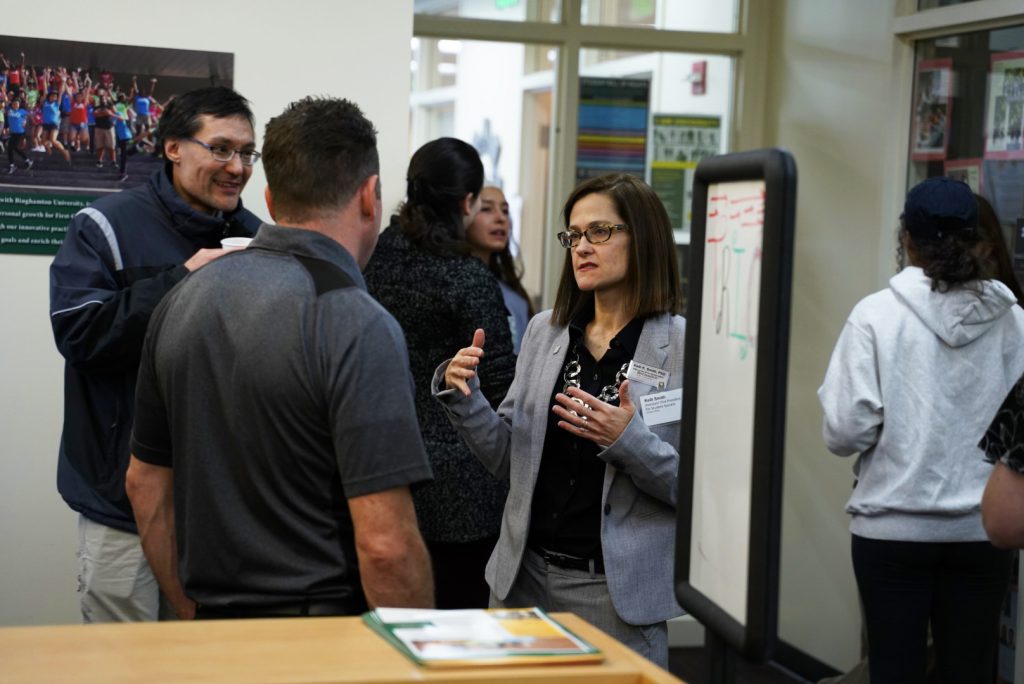
According to the Student Support Services (SSS) office, about one-third of Binghamton University students are first-generation college students.
On Thursday, SSS and the Education Opportunity Program (EOP) held a celebration in honor of the anniversary of the Higher Education Act of 1965, a federal law that created programs to identify and provide services for individuals from disadvantaged backgrounds and allowed many low-income students, students of color and students with disabilities to attend college. Often, these students were the first in their families to do so.
U.S. President Lyndon Johnson signed the Higher Education Act into law in 1965 as part of his Great Society agenda to eliminate poverty and racial injustice. SSS aims to promote academic success and personal growth for first-generation students, low-income students and students with disabilities.
The event, celebrated nationally as First-Generation College Celebration Day, brought students, faculty and staff together to celebrate students and their accomplishments with the program. The event also aimed to reflect on the importance of educational opportunity programs in creating a fairer society.
Marissa Zelman, assistant director for SSS, said the event was meant to raise awareness about the first-generation college student identity and highlight the social and professional support services available to students.
“Many people don’t know [this identity] exists,” Zelman said. “It’s an invisible identity, so a lot of our students, they kind of go through this struggle of not having the social capital, not having parents or guardians who can guide them through college, and they go through it silently because it’s an [invisible] identity.”
Zelman said the EOP at BU helps students with confidence, as many of them come from backgrounds where academic pursuits and knowledge of the college process has been limited.
“A lot of our students face common struggles of imposter syndrome, where they got to college on their own with great grades, but they don’t feel that they truly belong here because they don’t come from legacy,” Zelman said. “So we’re there to support them because they definitely have the traits to be successful, they just don’t know it yet.”
SSS also helps students with various aspects of the college process, from selecting classes and a major to academic skills workshops and personal counseling.
Kajol Bahl, a senior majoring in integrative neuroscience, is a first-generation college student with parents from India who were unfamiliar with the college process while she was applying to the University. Now, Bahl is a mentor and tutor in the SSS program, which she said has helped her find direction and support.
“As a [first-generation college student], I’ve been able to connect well with other first-gens here, so now I’m a mentor and [I feel that] the way that I was able to connect with my mentor, they’re able to connect with me,” Bahl said. “So it’s nice that I’m able to share my wisdom with them.”
According to Amanda Sprague-Getsy, a sophomore majoring in environmental studies, finding support can be difficult as a first-generation student, and the EOP program helps bridge the gap.
“As much as my parents wanted to support me, they didn’t know much about the process,” Sprague-Getsy said. “I definitely had a hard time adjusting to college from high school just because it was so different from high school and the classes were a lot more challenging. Having programs like SSS is so nice, because I get unconditional support and they give opportunities like this [event] for me to meet and network [with students and professors].”
According to Zelman, the day focused on celebrating students’ successes within the program and recognizing the challenges they faced to get there.
“I get to see them graduate and do amazing things,” Zelman said. “We’ve had several of our students win the Undergraduate Excellence Award, and several have actually gone on to win a Chancellor’s Award. They got full rides to law school, they’re owning their own businesses [and] they’re doing amazing things.”


